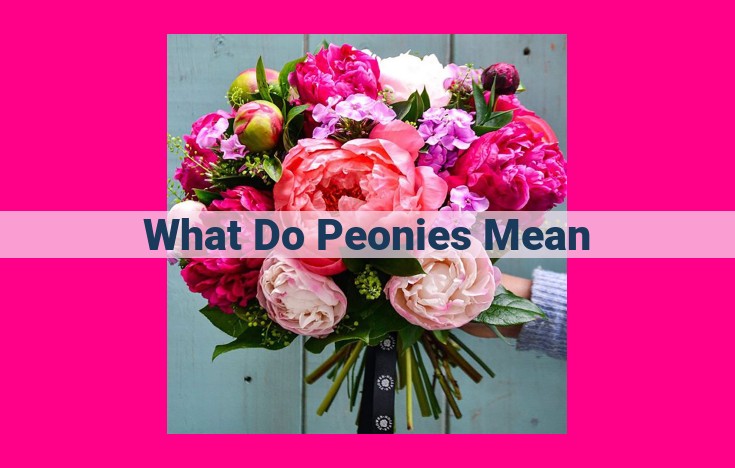Peonies: Unveiling The Cultural And Symbolic Significance Of A Beloved Flower

Peonies, vibrant and opulent, hold a wealth of cultural and symbolic meanings. In China, where they adorned imperial gardens, they represent wealth, fortune, honor, and compassion. Empress Wu Zetian’s patronage further elevated their status. In Japan, peonies grace gardens and art, evoking similar themes. Modern interpretations extend their symbolism to art, design, and fashion, reflecting their enduring appeal as emblems of beauty, prosperity, and romance.
The Peony: A Flower Steeped in History and Culture
Throughout history, the peony has held a profound significance in both Chinese and Japanese cultures. In China, its origins can be traced back to ancient imperial history, where it was deeply associated with the Imperial Family. During the Tang Dynasty, Empress Wu Zetian became a renowned patron of the peony, elevating its status to unprecedented heights. Empress Wu’s imperial gardens were adorned with exquisite peonies, and she even had a special pavilion dedicated to these magnificent blooms, further cementing their prominence in Chinese culture.
Beyond imperial history, the peony also played a significant role in Chinese民间文化. In art and literature, it became a symbol of prosperity, wealth, and honor. The peony’s beauty and elegance were celebrated in paintings, poems, and songs, capturing the hearts and imaginations of the Chinese people.
Symbolic Meanings of Peonies in Chinese Culture
Wealth and Prosperity
In Chinese culture, peonies are revered as symbols of abundance and prosperity. Their opulent blooms and lush foliage embody the qualities of wealth and financial success. It is believed that displaying peonies in one’s home or garden will attract fortune and prosperity.
Good Fortune and Honor
Peonies are also associated with good luck and honor. Their vibrant colors, especially red, are seen as auspicious omens. Gifting someone a peony is a way to wish them happiness, success, and long life. Peonies are often featured in traditional Chinese art and décor to symbolize these positive attributes.
Compassion and Romance
Peonies have a delicate and romantic side as well. They represent compassion, love, and marital bliss. In traditional Chinese weddings, peonies are often used in bouquets and decorations to symbolize the couple’s happiness and the longevity of their union.
Connection to the Royal Gardens of Japan
Peonies have left an enduring mark on both Chinese and Japanese cultures. They were introduced to Japan in the 8th century and quickly became a favorite in royal gardens. The Japanese emperor would often host peony-viewing parties during the spring, a tradition that continues to this day. Peonies symbolize wealth, prosperity, and good fortune in Japan, making them a popular choice for gardens, homes, and even as motifs in art and clothing.
The Peony’s Captivating Presence in Japanese Culture
Historical Roots:
The peony’s journey to Japan began centuries ago, where it gained its place as a beloved garden flower. During the Heian period (794-1185), peonies were introduced to the Imperial Gardens, where they earned the admiration of the Japanese court. The flower’s beauty and elegance were celebrated in poems and literature, solidifying its cultural significance.
Artistic Expression:
Peonies found their way into Japanese art as a common subject for paintings and woodblock prints. Their lush petals and vibrant colors inspired renowned artists like Katsushika Hokusai and Utamaro Kitagawa. The peony’s portrayal ranged from delicate brushstrokes capturing its graceful form to bold depictions of its blossoming splendor.
Symbolic Parallels and Distinctions:
While the peony shared some symbolic meanings with its Chinese counterpart, Japanese culture developed its own unique interpretations. Like in China, peonies represented good fortune, wealth, and honor. However, the Japanese also connected them with longevity and prosperity. This difference highlights the divergence of cultural interpretations over time and distance.
Modern-Day Relevance:
Today, peonies continue to hold a special place in Japan. They are prized as garden plants and have become a symbol of Spring’s arrival. In contemporary Japanese art and design, peony motifs add an air of elegance and beauty to various creations. The flower’s enduring popularity speaks to its timeless appeal and adaptability to changing cultural contexts.
Modern-Day Interpretation of Peony Symbolism
- Explore how the symbolism of peonies has evolved over time.
- Discuss the use of peonies in modern art, design, and fashion.
- Examine the continued relevance of peony symbolism in contemporary society.
Modern-Day Interpretation of Peony Symbolism
In the tapestry of human history, symbols evolve and adapt, infusing new meanings into ancient emblems. The peony, once revered in imperial courts, now blossoms with fresh significance in the modern world.
Over the centuries, the peony has transcended its cultural origins, becoming a global emblem of beauty, grace, and elegance. In art and design, peonies adorn canvases, textiles, and sculptures, where their intricate petals inspire awe and admiration. Fashion houses embrace their feminine charm, incorporating peonies into delicate gowns and vibrant prints, adding a touch of romance and sophistication to contemporary attire.
Beyond aesthetics, the peony’s symbolism continues to resonate in contemporary society. Its association with wealth and prosperity persists in business and finance, where it represents growth, abundance, and success. Furthermore, the peony’s timeless allure as a floral emblem of love remains strong, making it a popular choice for wedding bouquets and romantic gestures.
In contemporary culture, the peony has also become a symbol of self-care and well-being. Its delicate petals and soothing colors evoke a sense of calm and serenity. Peony-scented candles, bath salts, and teas create a tranquil atmosphere, inviting individuals to relax and rejuvenate. By embracing the modern interpretations of peony symbolism, we not only appreciate its beauty but also connect to its timeless essence and its enduring relevance in the human experience.





